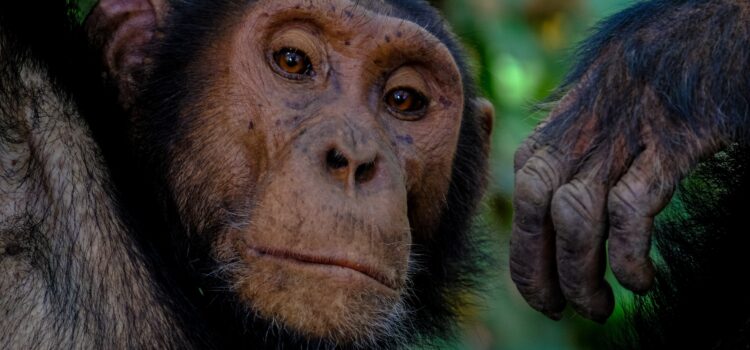

This article is an excerpt from the Shortform book guide to "The Chimp Paradox" by Steve Peters. Shortform has the world's best summaries and analyses of books you should be reading.
Like this article? Sign up for a free trial here .
What is the difference between Chimp thinking and Human thinking? How can knowing this help to control your emotions? What happens when your frontal lobe stops working?
In The Chimp Paradox, Steve Peters introduces his chimp paradox model. He says that there are two distinct kinds of thinking: Chimp thinking and Human thinking. In this article, we’ll explain the key differences between these kinds of thinking and what motivates your inner Chimp and Human.
Discover what causes Chimp thinking and how it can get you into some sticky situations.
Chimp Thinking & Human Thinking
In The Chimp Paradox inner chimp model, the brain is split into two areas:
- The Chimp brain, controlled by your limbic lobe
- The Human brain, controlled by your frontal lobe
The Chimp and Human are the two primary forces driving your reactions to the world. They each have different ways of thinking and differing agendas. Chimp thinking is when your inner Chimp takes over, which can hinder you in certain situations.
In this article, you’ll learn what motivates your chimp brain, and how to tell when it is your chimp thinking.
Understanding Your Chimp and Your Human
Your Chimp thinking (emotional) and your Human thinking (rational) are two separate, independent kinds of thought. At any given time, your reactions and decisions are controlled by one or the other. You can sometimes recognize the conflict between these two elements when you find yourself talking to yourself, having battles in your head between emotion and reason.
There is scientific evidence showing that only one of these influences controls us at any given time. Brain scans can detect blood flowing to one area over another depending on which is being used: If you’re having calm, rational thoughts, more blood flows to the frontal lobe—the Human area. If you’re having emotional, distressed thoughts, more blood flows to the limbic lobe—leading to your Chimp thinking.
The Chimp and the Human operate with different thought patterns, agendas (goals), and laws. We’ll explore each of these differences below.
Your Chimp Brain
The Chimp brain makes decisions emotionally, basing thoughts on assumptions and hunches. This can be either good or bad: Sometimes, your “gut feeling” is accurate and perceives something subtle that your rational mind misses. Other times, gut feelings are based on overly negative, defensive, or paranoid thoughts, and can direct you wrongly. This is the paradox: The Chimp’s thinking can be sometimes helpful and sometimes harmful. Understanding how your Chimp thinks and operates will allow you to harness its emotional drives when they can benefit you, while limiting the harm they can cause when they turn negative.
Your Chimp’s Thinking
As we stated earlier, your Chimp thinking is emotional and irrational. Therefore, when it reacts to a situation, it:
- Jumps to conclusions: A Chimp makes fast judgments before it has a full set of information.
- Thinks in black and white: Chimps see situations as either very good or very bad, and are unable to process subtleties.
- Digs in: Chimps don’t often consider alternate points of view or other interpretations, and once they’ve chosen a stance, they tend to defend it blindly, regardless of what additional information comes to light.
- Is paranoid: Your Chimp has evolved to look out for danger and therefore defaults to paranoia in situations where it doesn’t understand what’s going on. The more insecure your Chimp feels, the less trusting it becomes, and in uncomfortable situations, it can easily interpret harmless situations as dangerous—for example, it might hear offhand comments and assume they’re insults.
- Thinks catastrophically: Because of its tendency to see danger everywhere, your Chimp overreacts to situations with intense emotion, anxiety, and despair.
- Thinks irrationally: Because your Chimp jumps to conclusions, it doesn’t evaluate whether something is likely or realistic before settling on an opinion. Therefore, its thoughts are often ungrounded in reality or logic.
- Judges first, questions second: A Chimp makes its judgments based on feelings and impressions and only then looks for facts and rational to back up its decisions.
When a Chimp reacts with these instincts, it can cause problems that could have been avoided. For example, imagine Tom is waiting for his brother, Joe, outside a restaurant. Joe is so late that they’ve missed their reservation. Tom’s Chimp hijacks his brain with emotional thoughts, such as: Joe knows I hate being late, he doesn’t respect my time, he’s let me down, and so on. When Joe does show up, Tom’s Chimp drives him to confront Joe angrily before asking for an explanation. When Joe defends himself by explaining what held him up, Tom’s Chimp switches to feeling remorse and embarrassment, but the damage to their relationship has already been done, and neither brother enjoys the rest of the evening.
Your Chimp’s Agenda
Your Chimp’s thinking is emotional and irrational because it has two primary goals:
- Self-survival: Your Chimp wants to protect itself from harm, which is why it’s so attuned to danger.
- Perpetuating the species: Your Chimp wants to produce the next generation, which means it’s imbued with instincts and drives that influence its reactions.
Your Chimp is always, unfailingly, looking to satisfy these two goals. When you understand this and how these goals influence your Chimp’s thinking and laws of operation, you can find ways to satisfy these urges that will keep your Chimp under control.
Your Chimp’s Laws
To carry out its agenda, the Chimp operates according to the laws of the jungle, which are based on instincts, drives, vulnerability, and gender, each of which is explored below.
Instincts
The laws of the jungle are based first and foremost on instincts: innate responses designed to increase our chances of survival. These are automatic reactions to triggers that don’t require any conscious thinking. For example, a baby instinctively sucks on things because it’s pre-programmed to nurse.
The Chimp’s instinctive response to danger is the Fight, Flight, or Freeze reaction (FFF). This is nature’s way of protecting us by prompting us to either:
- Fight, by confronting a threat
- Flee, by running from a threat
- Freeze, by keeping still so that the threat doesn’t notice us
Remember that the Chimp’s agenda is to survive, and the FFF response is designed to help ensure survival by enabling the Chimp to act immediately and without thinking. Because of this, the Chimp doesn’t take time to assess which threats are significant and which are trivial, and therefore, just to be safe, your Chimp reacts to any threats as if they were mortal threats. This is why your emotional response to triggers is often extreme.
While this may be a helpful response to threats in the jungle, in society such an intense reaction can cause more problems than it solves. For example, if you have to make a public speech, your inner Chimp might start screaming, “But this might kill me!” and prompt you to either avoid it (flight) or stumble and forget your lines (freeze).
In this way, your Chimp thinking is motivated by the desire to survive.
Drives
The laws of the jungle are also determined by drives, which are similar to instincts but are not triggered by specific events like instincts are; drives are always present, influencing our decisions.
Your Chimp has powerful drives like sex, dominance, territorial defense, parental behaviors, and the desire to belong to a group, all of which advance its agenda of survival and the production of offspring. Because these drives are so important to the survival of the species, we have evolved pleasure responses to them, so that engaging in these drives feels enjoyable.
Like with instincts, drives can be helpful in a jungle but harmful in society. For example, each of us is born with a drive to eat. In a jungle, when presented with food, we are driven to gorge on it because we don’t know when we might eat again. In society, this drive can lead to obesity, because it’s far less likely that we won’t be able to find food again after a meal.
Further, the pleasurable element attached to drives can become a problem in and of itself, if it leads to addiction. Any of the Chimp’s drives can end up as an addiction, which can cause great harm to a person’s life.
Vulnerability
The laws of the jungle are also determined by feelings of vulnerability. A Chimp often feels insecure because there are many animals in a jungle more powerful than it (for example, a tiger—or in real life, your boss). A feeling of vulnerability drives much of the Chimp’s thinking and behavior, such as aggression, defensiveness, or a tendency toward paranoia.
Gender
The type of jungle laws your particular inner Chimp adheres to is determined by whether you have a male or female inner Chimp. Some inner Chimps are male while others are female, and your interactions with the world will be determined in large part by which gender your particular inner Chimp is. The gender of someone’s inner Chimp doesn’t have anything to do with that person’s actual gender. While male and female people are very similar, a male or female inner Chimp is very different. The discussion here of the inner Chimp’s gender is based on physiological differences in men and women that correspond to different evolutionary needs of male and female chimpanzees in the jungle.
One major difference is the differing amounts of the hormones estrogen and testosterone in each gender—men have more testosterone while women have more estrogen. Testosterone imparts a higher sex drive and more aggression, while estrogen promotes calmness and passivity. Therefore, a male inner Chimp and a female inner Chimp will have different levels of aggression and calmness.
Another difference is that women’s brains have more connections to the emotional regions of the brain (the left amygdala has more brain connections than men’s left amygdalas). In theory this is because in the wild, female chimpanzees are naturally smaller than the males, and therefore must develop skills other than brute strength in order to survive. For this reason, females are better at judging body language and mood, since that helps them protect themselves from threats they may not be able to physically fight off.
Because of this need to protect herself from physical threats in non-physical ways, and because a female chimpanzee is tasked with protecting her young and providing shelter for them, it benefits a female chimpanzee to be insecure enough that she’s constantly looking for threats. Similarly, female inner Chimps are often insecure and overly cautious. Further, because they are quick to become anxious, they often avoid making decisions out of a fear of making the wrong decision. Whether you’re a man or a woman, if you find yourself unable to confidently make decisions, it’s not because of a problem with you, it’s because your inner emotional Chimp has hijacked your brain.
Your Human Brain
In contrast, your inner Human makes decisions rationally, basing thoughts on facts and logic. The Human’s main job is to balance the Chimp’s thinking with rational thinking.
The importance of the Human part of the brain (the frontal lobe) is evidenced by what happens when it stops working properly. People who have suffered injuries to their frontal lobes lose the ability to regulate their emotional impulses. A famous example of this was Phineas Gage, a railroad employee in the late 19th century who survived an explosion that thrust an iron rod through his eye and out the top of his skull, destroying his frontal lobe but leaving him otherwise functional. After the injury, his personality completely changed; while he had once been careful, responsible, and thoughtful, he instead turned foul-mouthed, impulsive, and aggressive.
Your Human’s Thinking
Your Human reacts to a situation with logical, rational thinking. This means:
- Looking for evidence: Humans base their opinions on facts, and will weigh different points of view before settling on a conclusion.
- Being realistic: Humans ask whether a conclusion is likely or whether it’s unrealistic.
- Seeing context: Humans keep an eye on context in a situation, asking how something came to happen or why someone said a certain thing.
- Seeing perspective: Humans keep an eye on the long-term timeline, understanding that things that happen are temporary events. This allows Humans to temper their reaction, knowing that something bad that happens now will pass, and isn’t worth getting overly upset about.
- Seeing shades of gray: Humans can see subtleties that Chimps are blind to, understanding that things are not always simply good or simply bad. Therefore, Humans are less likely to judge someone harshly for doing something wrong because they understand that everyone has some good and some bad in them.
- Looking for reasons: Humans look for explanations to make sense of someone else’s behavior.
Your Human’s Agenda
Like your Chimp brain, your Human brain has two overriding goals. These goals, though, are fundamentally different from your Chimp’s purely survivalist goals:
- Self-fulfillment: Humans want to become the best versions of themselves possible and to achieve meaningful success. This will mean different things to different people: For example, some people will want to establish financially secure lives for themselves and their families, while others may feel fulfilled helping other people instead.
- Societal harmony: Humans are instinctively social creatures and want to establish societies that enable peaceful coexistence with each other through rules and laws. These rules and laws are designed to control the Chimp thinking inside each of us, so that the Human can remain in control of our behaviors.
Your Human’s Laws
Because its goals are more socially focused than your Chimp’s goals, your Human brain operates through laws of society rather than the laws of the jungle. Such laws allow people to work and live together peacefully, and are based on:
- Honesty: If people aren’t honest, loyal, and reliable, they can’t trust each other. A society needs trust in order to work properly.
- Compassion: The ability to understand and empathize with others’ experiences is a crucial element of a developed society—people helping other people in need is what differentiates our species from other animal species.
- Conscience: The ability to feel remorse is another crucial element of a functioning society, for if people don’t feel bad about their mistakes, they won’t improve themselves.
- Lawfulness: Humans tend to follow rules, both written and unwritten, accept responsibility for their actions, and hold other people accountable for their mistakes.
- Self-control: Humans differ from Chimps in their ability to control their impulses. While Chimps act immediately on their emotional triggers and demand immediate gratification, Humans are able to override their reaction impulses and delay their rewards.
- Purposefulness: Humans innately seek a higher purpose and meaning for their lives.
- Achievement: Humans like to accomplish goals—something that furthers their sense of purpose, mentioned above.

———End of Preview———
Like what you just read? Read the rest of the world's best book summary and analysis of Steve Peters's "The Chimp Paradox" at Shortform .
Here's what you'll find in our full The Chimp Paradox summary :
- Why we struggle to control our urges, succumb to temptation, and sabotage our own success
- How to manage your inner chimp to become happier, more balanced, and successful
- Why your psychological world is like a solar system with 7 planets







I think this chimp part of the brain is rubbish and don’t exist at all. Ask your self if you was accused of something you haven’t done, does your brain tell you to just Kettering it go and let karma sort it out ? Or do you seek revenge because your innocent.